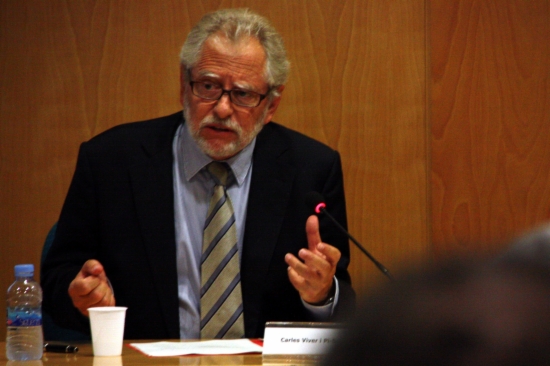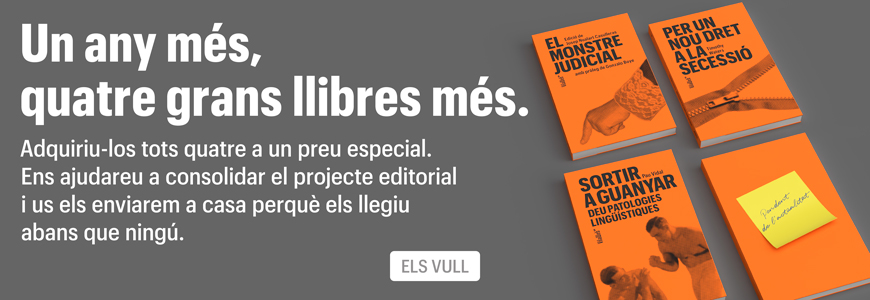17.06.2014 - 09:36
The Centre for European Policy Studies (CEPS) has canceled a debate at the last minute on the Catalan sovereignty process that was to be held today in Brussels. The principal think tank in the EU capital city had invited the president of the Catalan Government’s National Transition Advisory Council (CATN), Carles Viver i Pi-Sunyer, but finally retreated and called off the event. Sources at Catalonia’s Public Diplomacy Council (DiploCAT) see “the hand of the Spanish government”. “Ever since a date and question were agreed on, they have been trying to avoid or condition all the events that we organize abroad,” they complained to the ACN. The CEPS admits that “it is a very delicate topic” but denies the pressure.
With the title, “In or Out? Catalonia and the EU”, the CEPS debate was to analyze how an independent Catalonia might fit in the EU. More than sixty attendees had already registered, including diplomats and representatives of embassies in Brussels, civil servants from European institutions, lobbyists and members of think tanks and foundations. Steven Blockmans, the researcher in charge of International Policies studies at CEPS and professor at the Universities of Amsterdam and Lovaina was going to moderate the debate and Pi-Sunyer was going to present a report from the CATN.
The event was organized two weeks ago and CEPS management had approved the final format, but on Monday at 11am, with less than 24-hours notice, they decided to “postpone it”. The reason: “We haven’t been able to find a second speaker who would be willing to refute Pi-Sunyer and the CATN’s thesis in order to guarantee a balanced debate,” one of the think tank’s spokespeople told ACN. Initially, only presentations by Blockmans and Pi-Sunyer were planned, but at the last moment, CEPS said it wanted to add another speaker who would “be against” the sovereignty process, and “who didn’t have ties to the movement”. “We tried with members of the EU Justice Court, but they didn’t accept our invitation,” they added.
At DiploCAT, they are skeptical and see the “hand of the ministry” of José Manuel García-Margallo. “It’s very strange. It’s not believable that a study center that is as professional and serious as the CEPS would want to make such changes at the last minute.” “The program had been completely closed with the agreed-upon format last week and this Monday morning they decided to cancel it because they decided they didn’t like it,” they complained. CEPS’ website announced that the event had been postponed “due to circumstances beyond our control”. DiploCAT has managed to organize an alternate space in the International Press Center in Brussels, which is right across the street from the European Commission, so that the CATN president can present the report, despite the CEPS decision. DiploCAT’s General Secretary, Albert Royo, will introduce the event in Blockmans place. The event will be held at 9:30am.
The dean of the University of Lisbon Law School, Eduardo Vera-Cruz Pinto, complained in March that he had received pressure from the Spanish Government in order to block a DiploCAT event with the Catalan Government spokesperson Francesc Homs. In an article in Público, a Lisbon newspaper, Vera-Cruz Pinto expressed frustration about the “Spanish government’s attempt to silence a matter that is this important” and “the pressure of the Spanish diplomatic corps so that the University would not speak”. The Sciences Po College in Tolosa de Llenguadoc also received phone calls from the Spanish Embassy, according to sources at DiploCAT.
Mediator or International conciliator
It was Blockmans himself who defended the position, in a June 2, 2013 interview with ACN, that Catalonia and Spain should name an “external mediator or conciliator”. “The EU and the UN could play this role,” even though “both sides, Barcelona but also Madrid would have to accept mediation voluntarily” he explained. Blockmans recommended that if the Catalan Government finds it “impossible to negotiate” a referendum with the Spanish government that it “at least try to convince it to invite the EU to serve as a mediator” and thereby get through the “political standoff”. Founded in 1983, CEPS is the most influential think tank in the EU capital and “the leading debate forum for European affairs”. Directed by the German economist Daniel Gros, it has an annual budget of 6.7 million euros and employs thirty plus researchers from 21 different countries.





